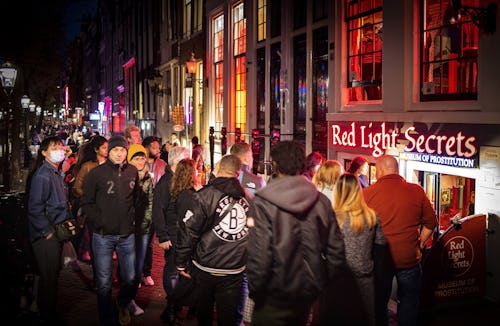Amsterdam city officials apparently want to pull the plug on the Red Light District
“The aim of the discouragement campaign is to keep out visitors that we do not want.”

As one of the oldest professions in the world, sex work has helped keep the (red) lights on in Amsterdam’s city center since the 15th century (possibly earlier, according to multiple historians). But this small part of downtown Amsterdam, known as the Red Light District, has become a huge problem for residents, sex workers, and city officials alike, as it attracts some of the world’s rowdiest, most annoyingly disrespectful crowds of tourists. So, in an attempt to tackle the issue, city officials are launching a new “Stay Away” advertising campaign in an attempt to dissuade certain tourists from visiting, CNN reported.
The campaign, which follows a similar attempt in June 2021, will launch in Spring 2023 and initially target “nuisance” British tourists, according to The Times. “The aim of the discouragement campaign is to keep out visitors that we do not want,” said Amsterdam deputy mayor Sofyan Mbarki. “If we love the city, we must take action now.” But the Dutch city isn’t just relying on digital “discouragement” ads to keep out sex- and drug–tourists. Officials also introduced several new policy measures to be voted on as soon as Dec. 21.
The new proposals include limiting tourist river cruises; enforcing earlier closing times for clubs, bars, and window brothels; and banning cannabis smoking in certain public areas. The campaign also aims to crack down on “nuisance” tourists by implementing overnight tourist limits, and by not permitting certain kinds of visitors within the Dutch capital – including cannabis, drug, and sex tourists, as well as bachelor party goers (who are, frankly, annoying anywhere they go).
Amsterdam Mayor Femke Halsema, elected in 2018, also emphasized the role of cannabis and soft drugs in contributing to the city’s issue with rowdy crowds. “Many of the major problems in the city are fueled by the cannabis market: from nuisance caused by drug tourism to serious crime and violence,” she said in an April 12 statement reported by Dutch News. “Banning sales to tourists is a necessary intervention… and the first step towards regulation,”
Halsema has also proposed some highly controversial measures to crack down on those rowdy crowds — such as relocating the Red Light District to an “erotic hotel” on the outskirts of town. “I hope it's possible to create an erotic center that has some class and distinction and isn't a place where only petty criminals, the most vulnerable women gather, but also people who are not ashamed to go there," Halsema told Dutch News in a Nov. 20 statement.
However, many sex workers say moving the district outside city limits would only leave them less protected. "That would be extremely dangerous. When you leave your shift at 5 a.m., the robbers will be lining up,” an anonymous source told CNN in a July 2020 interview. “We don't want to move into a prostitution hotel. Here everyone can see us. That's what makes our jobs safe.” According to an October 2019 survey conducted by Red Light United, an Amsterdam-based sex workers union, 93% of sex workers opposed the measure.
It’s clear Amsterdam faces a complex set of issues: It’s a centuries-old city filled with rich cultural history, and part of that history is the Red Light District. But as one of the only places in the world where prostitution is legal (along with liberal drug and alcohol laws), it tends to draw crowds of rowdy, disrespectful tourists who are there to indulge in all of life’s vices. However, it’s also located in one of the only countries in the world where sex workers are supported with legal protections, and sex workers and advocates alike are calling on the city to do a better job of protecting them from those rowdy crowds.
Jeroen de Jong, chief operating officer of Amsterdam Red Light District Tours, told CNN in a Dec. 18 interview that many of the complaints he receives from workers are about the lack of law enforcement. “We don't want more rules, but more enforcers and police.”
Linda Nap, who works at a sex accessories shop in the city, expressed concern about the government “regress[ing] everything” and “get[ting] all these fancy houses back to rich people.” She told CNN, “[The sex industry] has been here since the 1600s — people don’t come here only for the canals and tulips. Leave it be. If you have a problem, then move somewhere else.”